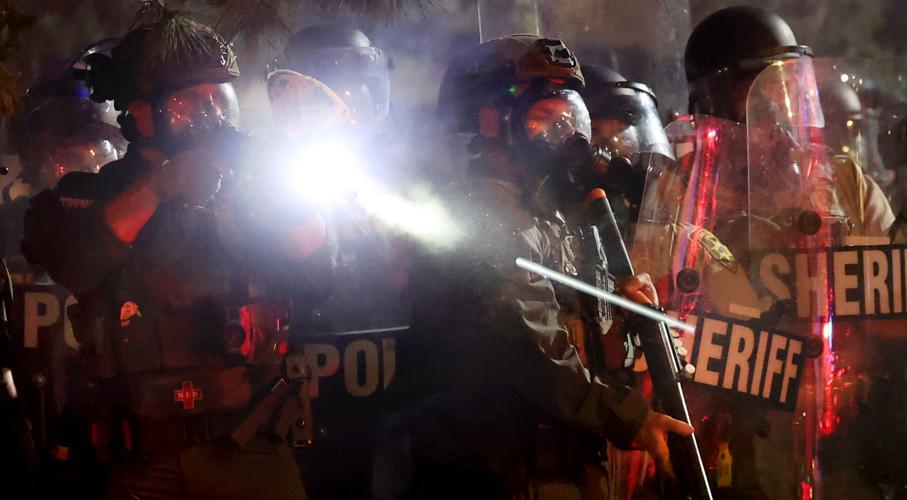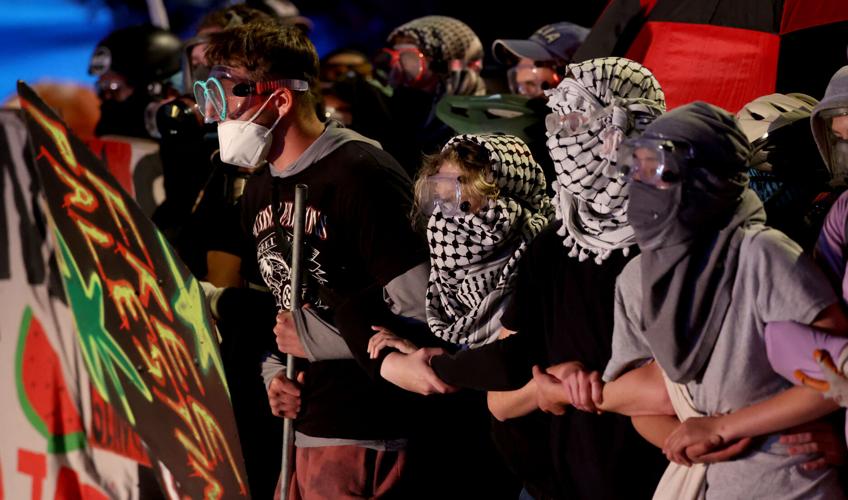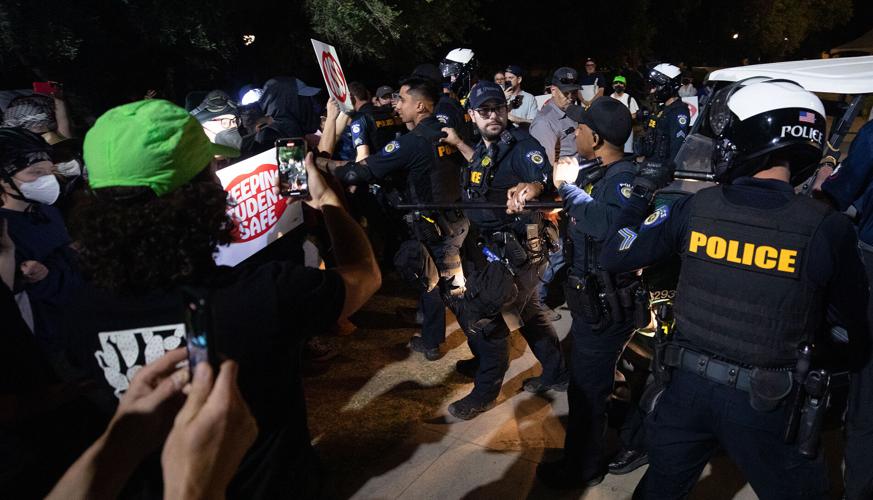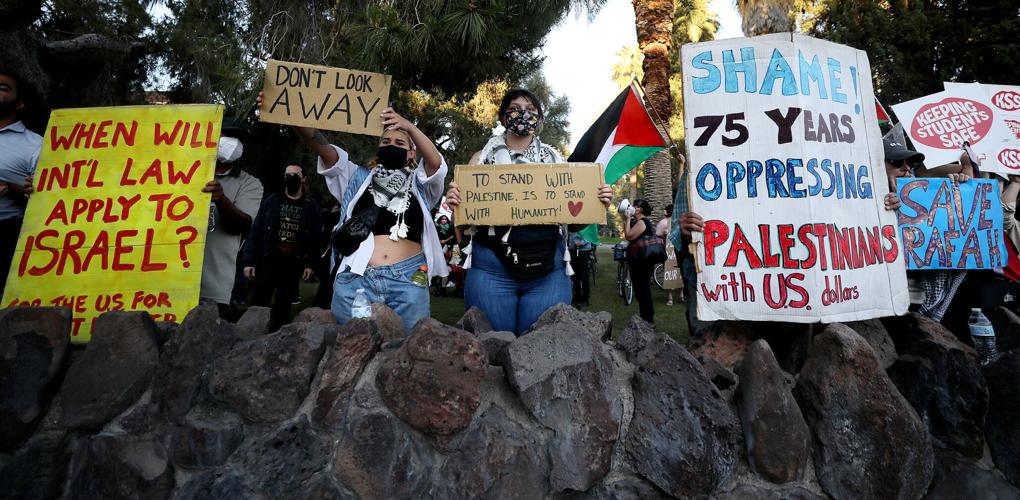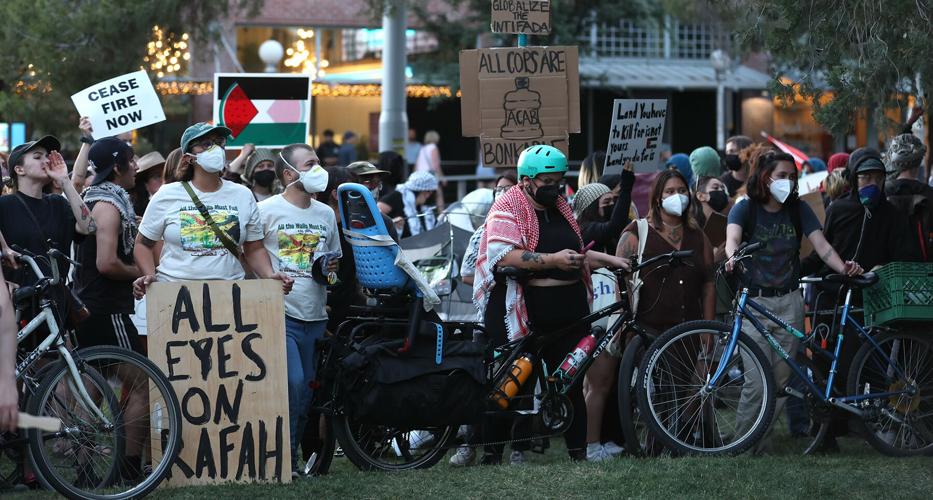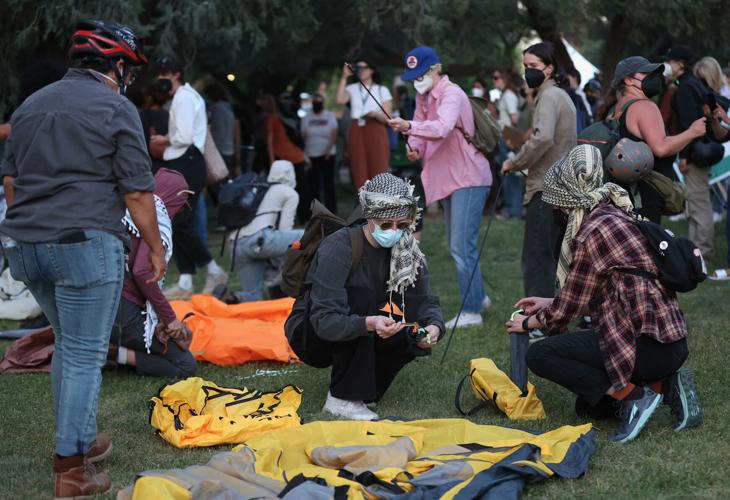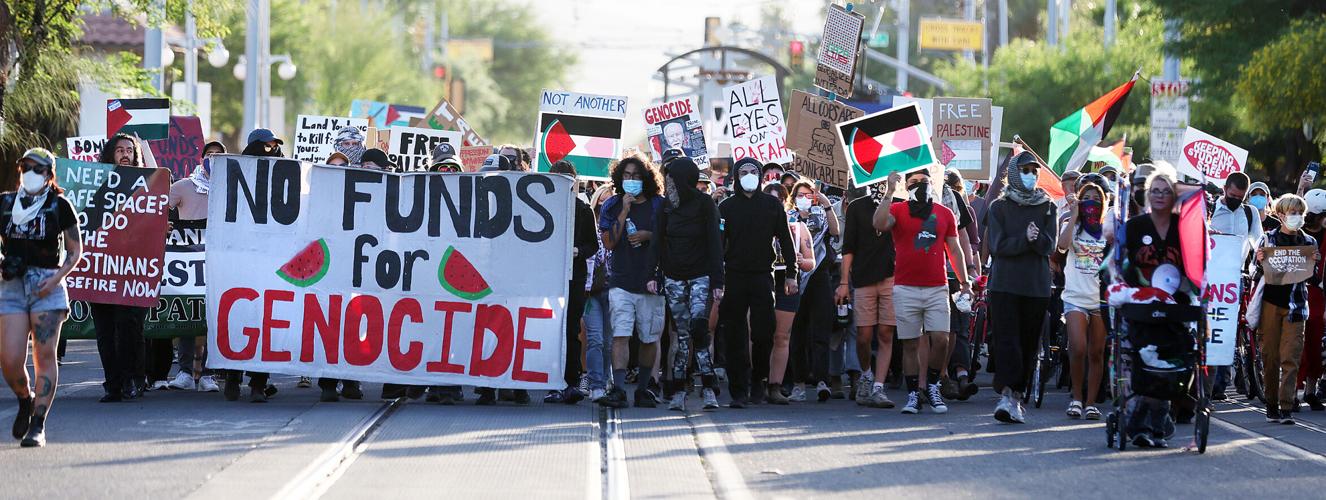Officers fired what appeared to be rubber bullets at protesters at the University of Arizona — for the second time in nine days — and demonstrators threw bottles at SWAT vehicles.
"This evening, police vehicles have been spiked, and rocks and water bottles have been thrown at officers and university staff," UA officials said in a written statement issued at about 11:40 p.m. Thursday. "Those who have violated the law are subject to arrest and prosecution. University officials have taken action to ensure the safety of Centennial Hall convocation attendees" on campus, not far from the protesters' encampment near UA's Main Gate.

An officer fires a chemical ammunition round into a cluster of demonstrators while clearing an encampment of pro-Palestinian demonstrators off the University of Arizona campus, May 10, 2024, Tucson, Az.
"University President Robert C. Robbins has initiated a zero-tolerance approach to enforcing its campus use policy to protect the campus, students, faculty, visitors and university events."
Police then announced they would use pepper balls and tear gas.
Photos: Police break up second pro-Palestinian encampment on University of Arizona campus
Pro-Palestine protests
Updated
Demonstrators retreat along University Boulevard in a cloud of teargas and taking hits from pepper balls as several area law enforcement agencies use chemical ammunition to clear an encampment of pro-Palestinian demonstrators off the University of Arizona campus, May 10, 2024, Tucson, Az.
Pro-Palestine protests
Updated
Demonstrators use homemade shields to fend off some of the pepper balls fired at them by law enforcement as pro-Palestinian protestors are pushed off the University of Arizona campus and west on University Boulevard, May 10, 2024, Tucson, Az.
Pro-Palestine protests
Updated
A demonstrator carries a street barricade, one of several protestors took to buttress the walls of their encampment of pro-Palestinian protestors on the University of Arizona campus, May 9, 2024, Tucson, Az.
Pro-Palestine protests
Updated
Law enforcement officers toss and kick away obstacles on Park Avenue left by retreating demonstrators as several area law enforcement clear an encampment of pro-Palestinian demonstrators off the University of Arizona campus, May 9, 2024, Tucson, Az.
Pro-Palestine protests
Updated
A line of demonstrators form a line to confront the area law enforcement agencies marching towards them near the intersection of Park Avenue and University Boulevard, May 10, 2024, Tucson, Az.
Pro-Palestine protests
Updated
Demonstrators retreats in a cloud of tear gas as several area law enforcement agencies clear an encampment of pro-Palestinian demonstrators off the University of Arizona campus, May 10, 2024, Tucson, Az.
Pro-Palestine protests
Updated
Arizona Department of Public Safety officers stop and don gas masks and riot helmets as they prepare to clear an encampment of pro-Palestinian demonstrators off the University of Arizona campus, May 9, 2024, Tucson, Az.
Pro-Palestine protests
Updated
A law enforcement officer pulls the pin on a tear gas canister while clearing an encampment of pro-Palestinian demonstrators off the University of Arizona campus, May 10, 2024, Tucson, Az.
Pro-Palestine protests
Updated
An officer fires a chemical ammunition round into a cluster of demonstrators while clearing an encampment of pro-Palestinian demonstrators off the University of Arizona campus, May 10, 2024, Tucson, Az.
Pro-Palestine protests
Updated
A line of several area law enforcement agencies stands at the intersection of University Boulevard and Park Avenue after ejecting a small group of pro-Palestinian demonstrators off the University of Arizona campus, May 10, 2024, Tucson, Az.
Pro-Palestine protests
Updated
A demonstrator claps to music in an encampment of pro-Palestinian demonstrators on the University of Arizona campus, May 9, 2024, Tucson, Az.
Pro-Palestine protests
Updated
Demonstrators hold a sign for traffic along Park Avenue outside an encampment of pro-Palestinian protestors on the University of Arizona campus, May 9, 2024, Tucson, Az.
Pro-Palestine protests
Updated
A demonstrator hauls in a pair of barricades appropriated to help reinforce the walls of an encampment of pro-Palestinian demonstrators on the University of Arizona campus, May 9, 2024, Tucson, Az.
Pro-Palestine protests
Updated
A demonstrator shines a laser into the faces of photographers watching an encampment of pro-Palestinian demonstrators on the University of Arizona campus, May 9, 2024, Tucson, Az.
Pro-Palestine protests
Updated
Officers from several area law enforcement agencies form a line and advance on an encampment of pro-Palestinian demonstrators on the University of Arizona campus, May 9, 2024, Tucson, Az.
Pro-Palestine protests
Updated
A demonstrator watches one line of law enforcement advance on the encampment of pro-Palestinian protestors at the University of Arizona, May 9, 2024, Tucson, Az.
Pro-Palestine protests
Updated
Demonstrators form a line as they prepare to face off with hundreds of law enforcement officers pushing them out of their encampment at the University of Arizona, May 9, 2024, Tucson, Az.
Pro-Palestine protests
Updated
Demonstrators lock arms after retreating out of their encampment as law enforcement officers push them down Park Avenue and off the University of Arizona campus, May 10, 2024, Tucson, Az.
Pro-Palestine protests
Updated
A demonstrator yells towards the law enforcement officers clearing an encampment of pro-Palestinian protestors at the University of Arizona, May 10, 2024, Tucson, Az.
Pro-Palestine protests
Updated
An organizer speaks to an encampment of pro-Palestinian demonstrators preparing to face off with law enforcement on the University of Arizona campus, May 9, 2024, Tucson, Az.
Pro-Palestine protests
Updated
A couple walks past graffiti on the wall of a Main Gate Square business after law enforcement forced a knot of pro-Palestinian demonstrators off the University of Arizona, May 10, 2024, Tucson, Az.
Pro-Palestinian protest
Updated
Two pro-Palestinian protesters organized set up a barrier to an encampment on the University of Arizona campus in Tucson, Ariz. on May 9, 2024. Police broke up the camp hours later.
Pro-Palestinian protest
Updated
A woman takes photos of pro-Palestinian protesters as they march on the University of Arizona campus and set up an encampment in Tucson, Ariz. on May 9, 2024.
Pro-Palestinian protest
Updated
Pro-Palestinian protesters organized push back on University of Arizona police as staff tried to set up flood lights on an encampment on the University of Arizona campus in Tucson, Ariz. on May 9, 2024. Police broke up the camp hours later.
Pro-Palestinian protest
Updated
Pro-Palestinian protesters set up tents for an encampment at the olive grove on the University of Arizona campus in Tucson, Ariz. on May 9, 2024. Police broke up the camp hours later.
Pro-Palestinian protest
Updated
Pro-Palestinian protesters organized by Students Against Apartheid march down University Blvd. to the University of Arizona campus in Tucson, Ariz. on May 9, 2024. Protesters set up another encampment which police broke up hours later.
Pro-Palestinian protest
Updated
A single pro-Palestinian protester walks down University Blvd. towards other marchers as they make their way to the University of Arizona campus in Tucson, Ariz. on May 9, 2024. The protesters set up another encampment, but it was broken up by police hours later.
Pro-Palestinian protest
Updated
Pro-Palestinian protesters organized by Students Against Apartheid gather in Catalina Park then marched to the University of Arizona campus and set up an encampment in Tucson, Ariz. on May 9, 2024.
Pro-Palestinian protest
Updated
Pro-Palestinian protesters stand along a wall at the olive grove on the University of Arizona campus and set up an encampment in Tucson, Ariz. on May 9, 2024. Police broke up the camp hours later.
Pro-Palestinian protest
Updated
An organizer speaks to pro-Palestinian protesters gathered at the olive grove on the University of Arizona campus in Tucson, Ariz. on May 9, 2024.
Pro-Palestinian protest
Updated
Pro-Palestinian protesters bring in supplies to set up an encampment at the olive grove on the University of Arizona campus in Tucson, Ariz. on May 9, 2024. Police broke up the camp hours later.
Pro-Palestinian protest
Updated
A University of Arizona police officer yells out to pro-Palestinian protesters that they will be arrested for trespassing as they set up an encampment at the olive grove on campus in Tucson, Ariz. on May 9, 2024.
Pro-Palestinian protest
Updated
A pro-Palestinian protester stands along Park Ave. near the olive grove at the University of Arizona campus in Tucson, Ariz. on May 9, 2024.
Pro-Palestinian protest
Updated
Pro-Palestinian protesters organized by Students Against Apartheid gathered in Catalina Park then marched to the University of Arizona campus and set up an encampment in Tucson, Ariz. on May 9, 2024.
Pro-Palestinian protest
Updated
Pro-Palestinian protesters set up an encampment at the olive grove on the University of Arizona campus in Tucson, Ariz. on May 9, 2024. Police broke up the camp hours later.
"We wish you no harm," police said. "You have been given every opportunity to leave." Police and SWAT officers in tactical gear began putting on gas masks and surrounding the camp of pro-Palestinian, anti-Israeli-war protesters from multiple sides.
Faculty and staff members holding "Keeping Students Safe" signs started lining up before the officers moved in on the camp of about 60 protesters.
At about midnight officers apparently began firing rubber bullets as well as tear gas. Protesters threw bottles containing some sort of yeast mixture at law enforcement vehicles.

Demonstrators lock arms after retreating out of their encampment as law enforcement officers push them down Park Avenue and off the University of Arizona campus, May 10, 2024, Tucson, Az.
Some members of the media, wearing press passes as they reported on the incidents, were hit with gas canisters.
Protesters retreated. They had used tents, furniture and barricades to create the unauthorized encampment starting about 5 p.m. Thursday, defying policies ordered by Robbins last week requiring that permits be obtained for any large gatherings on campus.
Robbins announced that rule after an earlier pro-Palestinian encampment ended about 2 a.m. May 1 with officers firing rubber bullets and pepper balls at protesters, including students, and making four arrests for trespassing after about 30 activists violated the 10:30 p.m. campus curfew for non-academic activity. Robbins said the protesters took dangerous actions and created a volatile situation and that officers "were assaulted with projectiles."

Pro-Palestinian protesters, demonstrating Thursday against Israel's actions in its war with Hamas in Gaza, were working to establish an encampment near the University of Arizona main gate.
The UA Police Department "will take a zero-tolerance approach, acting swiftly and decisively to enforce our campus use policy, which can include issuing no warnings before taking action," Robbins said then.
Thursday's protest group marched shortly after 4 p.m. from Tucson's Catalina Park to the olive grove on campus next to Main Gate near Park Avenue.
The group was led by faculty and staff carrying signs with the new "Keeping Students Safe" slogan.
"I felt such intense anger at seeing this happen to students last week," a non-tenure-track professor in the College of Education told the Arizona Daily Star. She would not give her name, saying she fears retaliation from the university.

Pro-Palestinian protesters gather on the University of Arizona campus Thursday evening saying they intend to establish an encampment.
Several hundred faculty members and graduate students signed and sent letters to Robbins last week denouncing his response, and the law enforcement use of force, to the April 30-May 1 encampment. “We the undersigned are writing in horror, dismay and anger in reaction to your decision to call the police on our own students who were peacefully protesting," said a petition circulating among the general faculty.

Pro-Palestinian protesters, demonstrating Thursday against Israel's actions in its war with Hamas in Gaza, were working to establish an encampment near the University of Arizona main gate.
Harlow Parkin, a first-year UA student and a member of the group that organized that encampment, Students Against Apartheid, was hit in the head that night by a rubber bullet.
Thursday night, one student protester told the demonstrators, who are rallying against Israel's actions in its war with Hamas in Gaza: "After a week of calm, let tonight be a reminder."
Once at their on-campus site, the protesters quickly erected wooden pallets, which they drilled together and tied with plastic zip ties. Next to the pallets they assembled tents, which are directly against university policy. The tents were surrounded by the wooden wall and by protesters, some of whom are staff and faculty. Bikes were also being used as a form of fencing.
While all of this was going on Thursday evening, students, some wearing graduation gowns, and their families were walking by. The university has many graduation ceremonies occurring over the next couple of days; on Friday, May 10, the university's main undergraduate ceremony is set to take place.
At 7:15 p.m., as the sun was beginning to set, a university official gave the campers their first warning of the night. She was met with boos.
"We're not leaving until Gaza is free," one organizer with a bullhorn shouted, to cheers.
"Absolutely willing to get arrested for this," a protester who would not give his last name, but said he is a second-year UA graduate student named Max, told the Star. "We are on the right side of this issue."
He said UA officials are ignoring the protesters' demands that the university divest from Israel. The university "has hundreds of millions invested," he said. "It would be incredibly simple to cease those."
Group members unloaded shields and helmets from a van as they were setting up. In a message to their followers, they included an "urgent supply list" including food, tables, tarps, chargers, water jugs and lights. Others dragged university barricades over from Old Main to fortify their camp.
UA facilities workers tried to erect floodlights at the encampment but left after protesters surrounded them, chanting, and began shaking a golf cart carrying workers.
A reporter saw a rock thrown toward an officer and a protester spit at an officer.
The Tucson Police Officers Association wrote on Facebook last week that after the earlier encampment, "Several TPD officers were assaulted with bottles and other objects, kicked, and spit on. This is beyond unacceptable and we will continue to advocate for every single person involved in the camp to be prosecuted to the fullest extent of the law.”
A member of the April 30-May 1 encampment who serves as a media liaison refused to answer questions from the Star or give a statement about the throwing of objects at officers.
UA police and employees issued a second warning to protesters at 9:30 Thursday night, telling them to clear out. Warnings were ignored, UA officials said later in their statement.
Some protesters were shining laser pointers at news photographers and TV crews, apparently to try to prevent photos and footage.
Robbins wrote last week to the university community: “While freedom of speech and free expression are encouraged at our university, we will not allow students, faculty, staff, or outside agitators to violate the law or our policies and put anyone at risk."
He said "a minimal use of pepper balls and rubber bullets" was warranted to disperse the crowd and for officers to protect themselves and others while clearing the area. "Thankfully, as of this message, we are not aware of any significant injuries to students, faculty, staff, protestors, or members of law enforcement," Robbins wrote.
Faculty members countered in a letter to Robbins they circulated later in the week: “Under the cloak of enforcing a legal curfew, you violated not only the primary directive of caring for students in your charge but also turned a peaceful protest into a violent confrontation.”
Separate petitions criticizing Robbins' order to police to break up last week's camp were written by general faculty, the School of Government and Public Policy, and the Center for Latin American Studies; two elected student government leaders also decried the use of force.
The School of Government and Public Policy letter said, “We are appalled by the disproportionate use of force against peaceful demonstrators including the use of rubber bullets, chemical irritants and arrests."
Mitch Zak, a spokesperson for the UA, said “the university supports free and open expression of ideas consistent with established campus policies. We appreciate that there are strong views, understand that some faculty disagree with our response, and respect their right to voice concerns.”
Students Against Apartheid, which organized the earlier encampment, said via Instagram that is demanding UA:
• Release a public statement "condemning Israel's genocidal campaign" and calling for an immediate and permanent ceasefire;
• Disclose all financial connections to Israel and weapons manufacturing, including Raytheon;
• Divest from all companies "profiting from the occupation of Palestine, the genocide of people in the Gaza strip and the militarization of the US/Mexico borderlands/unceded O'odham and Pascua Yaqui territories";
• "Demilitarize campus" by defunding the UA Police Department to redirect all resources "towards care and justice."
Pro-Palestinian protestors at the University of Arizona retreat after arrests.



